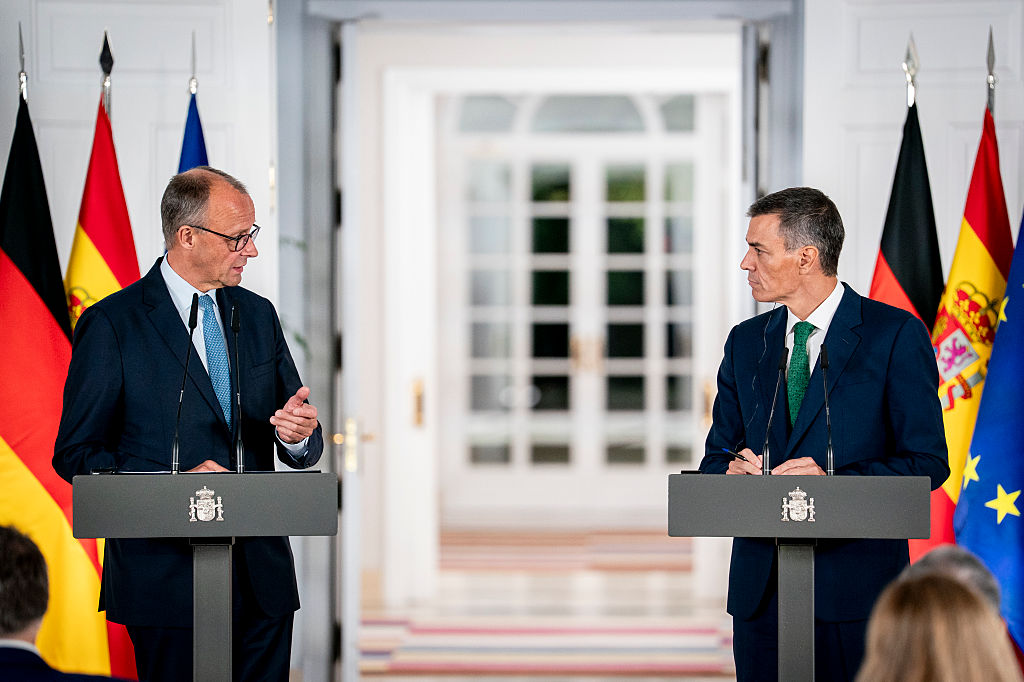What was anticipated as a meeting of opposites turned instead into a political tango, with Spain and Germany struggling to find a common rhythm.
On Thursday evening, Spanish Prime Minister Pedro Sánchez and German Chancellor Friedrich Merz appeared before reporters during Merz’s first official visit to Madrid since taking office in May.
Olaf Scholz, Merz’s predecessor, had cultivated close ties with Sánchez, a fellow Social Democrat, visiting just 40 days after becoming chancellor. Merz waited 135 days, making the visit seem long overdue. He sought to soften it by recalling childhood holidays spent in Cullera, on Spain’s Mediterranean coast.
The two leaders touted unity on Ukraine and a common European energy market, but their meeting was clouded by splits over defence spending and the war in Gaza, placing Madrid and Berlin on opposite ends of the spectrum.
A couple at odds
The sharpest rift emerged over Israel, as Spain hardened its stance against the war in Gaza. Sánchez said both governments share the same goals but “may differ on the paths to reach” them.
The European Commission on Wednesday unveiled sanctions on Israel. Sánchez called them long overdue, while Merz – citing debates in parliament and the coalition – said Germany’s position would likely emerge at the 1 October Informal Council in Copenhagen.
Pressed on why Spain calls the Gaza war a genocide while Germany does not, Sánchez was blunt: “Chancellor Merz has explained the position of the German government. I have explained the position of the Spanish government.”
Citing a recent UN report, Sánchez argued the situation in Gaza does constitute genocide, pledging Spain would remain outspoken until “violence ceases, peace arrives, and humanitarian aid is permitted.” Indiscriminate attacks on Gaza’s civilians, he warned, would not guarantee Israel’s security or that of the wider region.
Merz took a different line. While Berlin accepts Israeli methods are “subject to critical examination,” he rejected the genocide label, citing Germany’s historical context.
Both countries have acted, though unevenly. Sánchez announced a long-pledged law-decree enforcing a total arms embargo on Israel, shut Spanish airspace and ports to Israel-bound weapon and fuel transfers, and sanctioned far-right Israeli ministers.
Germany, by contrast, limited itself to suspending only certain military exports. As the offensive in Gaza expanded, Merz defended that choice, saying recent developments confirmed “there was no better choice, no better alternative.” He recently warned that criticism must not drift into antisemitism.
Israel reacted fiercely to Spain’s measures. Foreign Minister Gideon Sa’ar accused Sánchez of waging a “relentless anti-Israel and anti-Semitic campaign,” while Prime Minister Benjamin Netanyahu went further, alleging Sánchez had made “genocidal threats” against Israel.
Defence was another point of contention. Germany has signed off on €140 billion in new debt to raise military spending to 3.5% of GDP by 2029. Spain, however, argued its 2.1% contribution is enough.
Merz acknowledged Spain’s “impressive recovery” from a defence budget of just 0.9% in 2017, but insisted more is needed. “We will all have to make greater efforts,” he said.
(cz)

